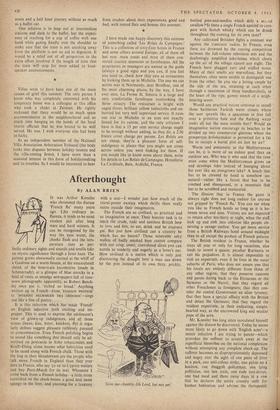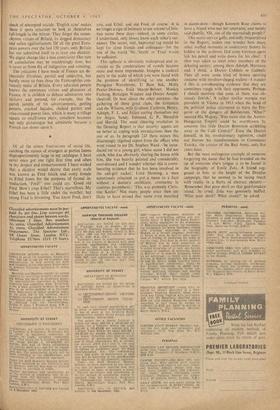Afterthought
By ALAN BRIEN IT was Arthur Koestler who christened the disease 'French flu' many years ago. Like ordinary in- fluenza, it tends to be most virulent just after long wars and hard winters. It can be recognised by the way the eyes water, the cheeks flush and the tem- perature rises as per- fectly ordinary sights and sounds and smells take on mystic significance through a fever haze. The patient grows abnormally excited at the whiff or a Gauloise on a warm breeze, at the emasculated shriek of the boat-train locomotive (made in Schenectady), at a glimpse of blue smocks in a field of vines, at smudgy newspapers full of time- worn photographs apparently, as Robert Bench- ley once put it, 'etched on bread.' Anything written up in French—from 'PASSAGE PROTEGE' to 'INTERDIT DECHARGER DES ORDURES'—SingS Out like a line of poetry.
It is this infection which has made `French' an English adjective both exciting and im- proper. This is used to express the adolescent's view of grown-up indulgences, and all those nouns (leave, kiss, letter, knickers, fly) it regu- larly defines suggest pleasure ruthlessly pursued to consummation. Even French polishing begins to sound like something that should only be ad- vertised on postcards in Soho tobacconists and Krafft-Ebing alone knows what lubricities need to be eased along with French chalk. Those with the bug in their bloodstream are the people who talk more French in England than they ever dare in France, who say 'ca va' to Cypriot waiters and buy Paris-Match for its text. Whenever I come back from a French holiday—a little more burnished on the cheek-bones, a good deal more spongy in the liver, and yearning for a lavatory
with a seat—I wonder just how much of the travel-poster exotica which thrills them really exists outside their imagination.
The French are so civilised, so practical and so imaginative at once. Their historic task is to teach the crude, rude and tasteless British how to love and live, to eat, drink and be toujours • gai. But just how civilised can a country be which has no bacon? Those miserable salty wafers of badly smoked ham cannot compare with our crisp, sweet, Convoluted slices you can nuzzle as tenderly and eagerly as a lover's ear. How civilised is a nation which is only just discovering the draught beer a man can down by the pint instead of its own fizzy, prickly,
'Give me chastity, Oh Lord, but not yet.'
bottled pins-and-needles which defy a secwid swallowrls there a single French aperitif to com- pare with Scotch whisky which can be drunk throughout the evening for its own taste?
Any cultivated Britisher fights a constant war against the transistor radios. In France, even these are drowned by the roaring competition between the full-volume television sets and the deafeningly amplified juke-boxes which churn up the air of the village square any night. The French have plugged ears and stuffed noses. Many of their smells are marvellous, but they themselves often seem unable to distinguish one from the other. So you see a loving couple by the side of the sea, straining at each 'other through a maximum of three handkerchiefs, in the heart of the ripe, gamey stench of a neigh- bouring sewer.
Would any practical nation continue to install those barbarous Turkish water closets where the user sprawls like a spaceman in free fall over a primitive hole and the flushing water soaks all but the most nimble feet? Would an imaginative nation encourage its beaches to be divided up into commercial ghettoes where the prosperous holidaymaker is permitted for a fat fee to occupy a burial plot six feet by six?
Warm and pneumatic as the Mediterranean can be, it is more of an' indoor pool than an outdoor sea. Who was it who said that the time must come when the Mediterranean grows up and develops tides instead of lounging about for ever like an overgrown lake? A beach that has to be cleaned by hand is somehow un- natural—rather like a forest that has to be combed and shampooed, or a mountain that has to be scrubbed and manicured.
The illusion that in France the guest is always right does not long endure for anyone ' not gripped by 'French flu.' You can eat when you like in French hotels so long as it is be- tween seven and nine. Visitors are not expected to return after ten-thirty at night, when the staff lock up and sink into oblivion like people ob- serving a savage curfew. You get more service from a British Railways hotel around midnight than in all except the poshest of French palaces. The British resident in France, whether he stays all year or only for long vacations, also tends to invent a quaint, peculiar Ruritania to , suit his prejudices. It is almost impossible to , visit an expatriate, even if he lives in the outer suburbs of Paris, who does not assure you that '!
his locals are entirely different from those of any other region; that they preserve customs and patois dating back to the Etruscans or the Saracens or the Nervii; that they regard all other Frenchmen as foreigners; that they con- sider the central Government an alien tyranny; that they have a special affinity with the British and detest the Germans; that they regard the resident expatriate, in their endearing, simple- hearted way, as the uncrowned king and secular pope of the area.
Mr. Koestler has long since inoculated himself against the disease he discovered. Today he seems more likely to go down with 'English acne'—a minor infection I am trying to patent—which provokes the sufferer to scratch away at the superficial blemishes on the national complexion without attempting any complete check-up. The sufferer becomes so disproportionately depressed ; and angry over the sight of one piece of litter in a park, one anti-colour strike, one pylon on a .
horizon, one thuggish policeman, one lying politician, one late train, one rude taxi-driv\er,
one bad meal and three rainy days in a row that he declares the entire country unfit for hurnan' habitation and advises the therapeutic shock of attempted suicide. 'English acne' makes those it spots reluctant to look at themselves full-length in the mirror. They forget the mono- chrome virtues of Britain, its dogged democracy and sullen egalitarianism. Of all the great Euro- pean powers over the last 150 years, only Britain has not submitted itself to at least one dictator. We digest change like a boa constrictor. Our rate of assimilation may be maddeningly slow, but it saves us from fits of indigestion and vomiting.
The criticisms I have made of France arc de-. liberately frivolous, partial and subjective, but hardly more so than those the Francophiles con- tinually make of Britain. Every educated person knows the enormous virtues and pleasures of France. It is childish to debase admiration into idolatry and pretend, for example, that the garish jumble of tin advertisements, peeling posters, cracked facades, choked gutters and criss-crossed power lines, which is many a village square or small-town place, somehow becomes not only picturesque but admirable because a French sun shines upon it.
Of all the minor frustrations of social life, catching the names of strangers at parties looms disproportionately large in my catalogue. I have never once got one right first time and often in my despair and embarrassment I have wished that a dictator would decree that every male was known as Fred Smith and every, female as Ethel Jones for the purposes of formal in- troduction. 'Fred!' you could cry. 'Good old Fred. How's your Ethel? That's marvellous. My Ethel has been a little under the weather, but Young Fred is blooming. You know Fred, don't you, and Ethel, and old Fred, of course.' It is no longer a sign of intimacy to use anyone's Chris- tian, name these days---indeed, in some circles. I understand, only lovers know each other's sur- names. The secret, real, baptismal tag would be kept for close friends and colleagues—for the rest of the world 'Mr. Smith' or 'Fred' would be sufficient.
This aphasia is obviously widespread and in- creaks as the combinations of vowels become more and more improbable. Imagine a cocktail party in the midst of which you were faced with the problem of identifying to one another Peregrine Worsthorne, U Bum Suk, Molly Panter-Downes, Enid Sharpe43olster. Monica Furlong, Bretaigrie Windust and Dmitri Amphi- theatroff. Or how' aboutthe other extreme—the gathering of those great clans, the Green(e)s and the Wilsons, with Graham, Carleton, Henry, Adolph, F. L. and Julien sorting themselves out for Angus, Sandy, Edmund, G. P., Meredith and Harold. The most cheering revelation in the Denning Report is that security agents are no better at coping with introductions than the rest of us. tn paragraph 243 there occurs this disarmingly slipshod report from the officer who went round to see Dr. Stephen Ward---'he intro- duced"me to a young girl, whose name I did not catch, who Was cibviously sharing the house with him. She Was heavily painted and considerably over-dressed and I wonder whether this is corro- borating evidence that he has been involved in the call-girl racket.' Lord Denning, a man notoriously reluctant to put a name to a face without a doctor's certificate, comments in cautious parenthesis: `This was probably Chris- tine Keeler.' Not many people since then are likely to have missed that name even mouthed
in dumb-show--though Kenneth Rose claims to have a friend who met her unawares, and merely said chattily, 'Oh, one of the marmalade people?'
This secret-service gaffe, unkindly immortalised in the Report, makes one wonder how many other muffed moments in undercover history lie hidden in the archives. Did some German agent lick his pencil and write down for his chief: 1 then was taken to meet other members of the debating society, among them Adolph. Hermann and, 1. think, a Doctor Cobbels or Gabbels. They all wore some kind of brown sporting costume with revolver-shaped wallets---I wonder if this • is corroborating evidence that they are sometimes rough with their opponents. Perhaps I should mention that none of them was ob- viously Jewish.' A rather similar myopia was prevalent in Vienna in 1913 when the head of the political police attempted to warn the Em- peror of the dangers of Bolshevism. 'What?' sneered His Majesty. You mean that the Austro- Hungarian Empire cOuld be overthrown by someone like little Doctor Bronstein scribbling away in the Café Central?' Even the Doctor himself, in his revolutionary optimism, could not foresee his transformation to Commissar Trotsky, the ereator.of the Red Army, only five years later.
But the most outrageous eNalOple of someone forgetting the name that -he had branded on the tip of everyone else's tongue is to be found in the biography of Emile Zola. A friend sug- gested to him, at the height of the Dreyfus campaign, that he seemed to be losing touch with ' reality in a flurry of abstract rhetoric— 'Remember that poor devil on that god-forsaken island.' he cried. Zola was genuinely baffled. 'What poor devil'? What island?' he asked.











































 Previous page
Previous page